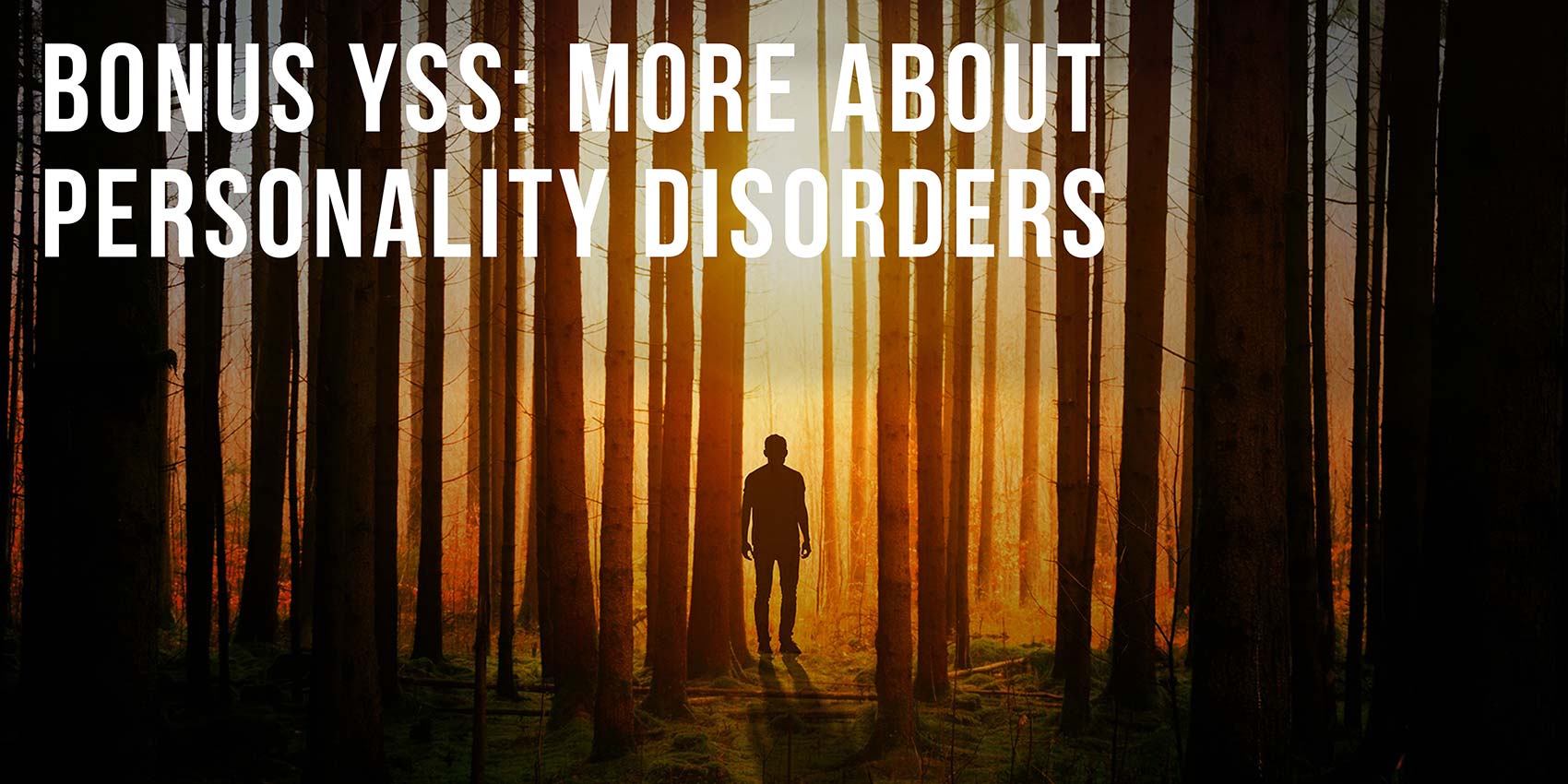27 Mar Bonus YSS: More about personality disorders

Below are the 6 most common Personality Disorders and their general characteristics so you have a basic idea of what each disorder is like.
Paranoid Personality Disorder (PPD): Characterized by very suspicious and distrustful behavior. People with PPD have constant doubts and fears about the motives of other people. They may not want to confide in people or may imagine that other people are planning harm. The suspicious behavior and thoughts usually have no justification. Therapy is helpful, as is medication to relieve the associated anxiety.
PPD: Yes, I have been living in the basement of my house for three weeks eating canned food because I can promise you that people are coming to take me away for the wrong I did as a child.
Normal teen life: I swear, Sam is always saying mean things about me. I don’t know why she hates me so much but she does!
Antisocial Personality Disorder (remember the Psychopath described in a previous post?): is characterized by continual antisocial or criminal behavior. This person has a difficult time conforming to social norms (social norms are what society considers appropriate behavior). This person breaks the law, lies and cheats and lacks any feelings of remorse for the behavior. Treatment involves therapy. Quite often, these people also abuse substances so medication for treatment can be tricky.
APD: I stole the cookies. So what? I broke into the cafeteria after dark, like I did the drug store last week. And I fed them to the dog. Who cares if he can’t have chocolate? He ate all the drugs last week too.
Normal teen life: I took an extra math textbook without asking. I know it was wrong but I lost mine and my parents will kill me for it. I am always losing things. I feel bad but I will replace it once I find my book.
Borderline Personality Disorder: A person with BPD has extreme emotional instability. They have trouble regulating their emotions which often leads to impulsive and/or self-destructive behavior. Also, their relationships suffer because they are emotionally unstable. They tend to shift from all good to all bad thoughts and feelings about who they are and the people in their lives. For instance, something will happen in a social situation that may not seem intense to a “normal” person but will make a person with BPD feel isolated or angry or overwhelmed and all of a sudden they will change their feelings toward someone from very friendly, trusting and even affectionate to hateful and angry. Treatment consists of therapy and sometimes antipsychotic medication to control anger.
BPD: I don’t trust Josephine anymore. She is a rat fink. I bet she spends her days thinking of ways to hurt people. After she forgot to text me back within ten minutes I knew I couldn’t rely on her anymore. But Kevin, now that’s someone I can really like. I just met him, but I know we will instantly be best friends forever.
Normal teen life: Josephine forgot to return my text again. Oh well. I’ll talk to her about it. And her friend Kevin seems nice, but I don’t really know him too well.
Histrionic Personality Disorder: Characterized by “colorful, dramatic, extroverted behavior in excitable, emotional persons” with an inability to maintain deep, meaningful long lasting relationships (Kaplan & Sadock). This person seeks attention through very dramatic means in which he or she needs to be the center of attention. Treatment involves therapy whereby the patient is helped to uncover his or her true feelings. Medication can be prescribed, but this is not often the case.
HPD: A recent break up= Melanie hasn’t stopped crying for two days. She and Tomias were only dating for a week. She has posted notices on Facebook and Twitter and has Face-timed all of her friends searching for comfort. She can’t seem to move on and has displayed a tremendous amount of drama over a relatively minor incident. Tomias didn’t even know they were dating, actually.
Normal teen life: A recent breakup= Melanie was shocked that Tomias ended things so quickly. After a bowl of ice cream and a devilishly gorgeous outfit picked out for the next day, she and her friends giggled over what a missed opportunity for Tomias.
Narcissistic Personality Disorder: Characterized by an elevated sense of self-importance, feeling unique in some special way and expecting special treatment. People with NPD handle criticism poorly and often become angry that someone would question them or their behavior. They often desire fame and fortune. People with NPD have difficulty in their interpersonal relationships as they hardly ever see themselves at fault. Treatment for people with NPD is difficult because narcissism is deeply embedded in the personality and their ability to empathize with others is limited. Antidepressants may be prescribed.
NPD: I really am so beautiful. People love me because I am so attractive inside and out. Sure, there have been a lot of people in my life that I have had to “let go” but that’s because they really have a lot of problems. My problem is that I am too nice and I always try to help them, but their problems are just too big and I can’t do everything for everybody. They all tell me I am selfish but really I know they are. I have to think about myself, other people should think more about me too.
Normal teen life: I’m pretty good looking and people generally like me. I have a good group of friends. I don’t hang out with the same kids I did in kindergarten but that’s because we have grown apart. Sure, I had a big fight with John and we’re no longer friends but he’s just not who I want to hang out with now. I like the friends I have, we all look out for each other.
Obsessive Compulsive Personality Disorder (OCPD): Characterized by a constant and consistent pattern of needing to be organized and perfect. A person with OCPD is rigid, stubborn, inflexible, and needs to be in constant control of a situation. They are preoccupied with rules and deadlines and being organized and detailed. They work toward perfection. They often lack a sense of humor. Unlike the other Personality Disorders, people with OCPD know they are suffering and often seek treatment. Therapy, including group therapy is suggested. Some medications have been helpful.
OCPD is different from Obsessive Compulsive Disorder (OCD), an anxiety disorder.
OCPD: Don’t touch my stuff! I made that perfectly neat and you’ve just ruined it. My notes are perfect, my slides are perfect. I know what I am doing. Get away. I am in charge of this presentation. I will do it my way, it’s better that way. We will get an A. I don’t need any help from you. It will be perfect three days before it’s due. Now go away.
Normal Teen life: OMG, I think we just messed up all the slides I made! Help me fix them. The project is due in an hour and I am freaking out!




Post Question:
Add any helpful thoughts you have here.
Answer the post question here
What's being said